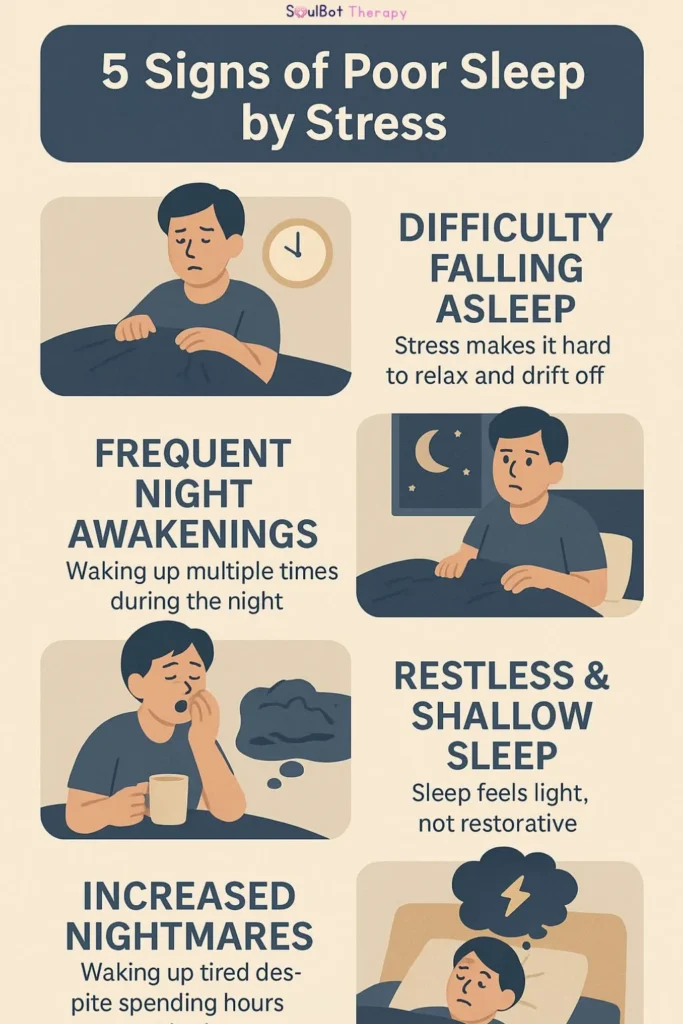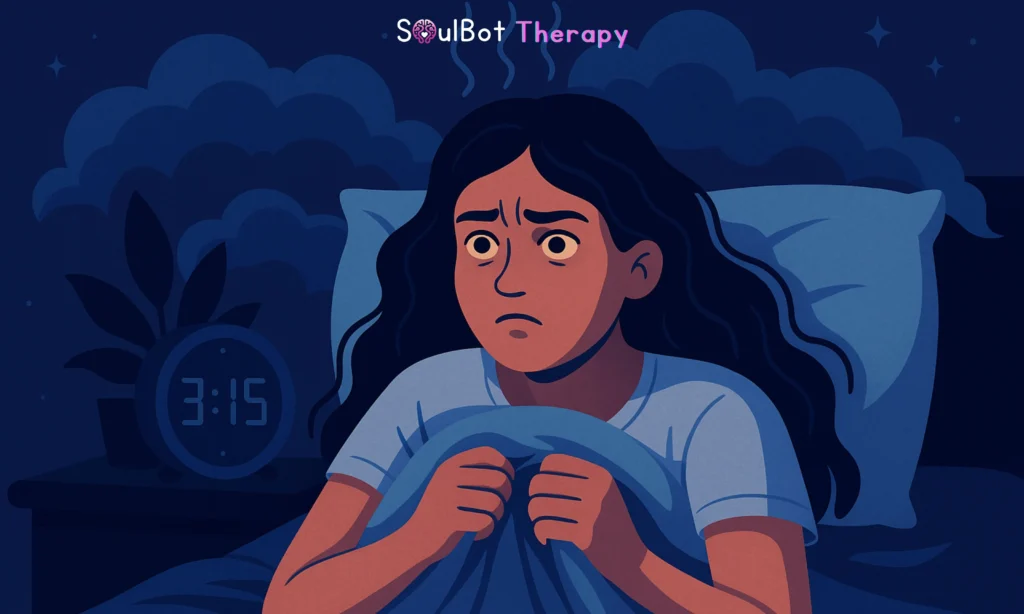We all still suffer from those nights lying in bed, replaying stressful thoughts while the clock ticks past midnight. The reality is simple: stress sabotages sleep, and poor sleep makes anxiety worse. Comprehending how stress affects sleep (and vice versa) is key to breaking this exhausting cycle and protecting your mental health.
✨Discover your true personality, take the SoulBot MBTI Test now!
How Does Stress Affect Sleep Quality?
Stress activates your body’s fight-or-flight response. Cortisol levels rise, heart rate speeds up, and your mind races with “what if” thoughts. This makes it harder to fall asleep and reduces the amount of deep, restorative sleep you get.
Common stress-related sleep problems include:
- Trouble falling asleep (insomnia)
- Frequent waking during the night
- Nightmares or restless sleep
- Feeling tired despite hours in bed
💡SoulFact: The American Psychological Association found that 43% of adults lose sleep due to stress, reporting poor sleep quality and reduced energy the next day.
Why Does Poor Sleep Increase Stress?
Here’s the catch: sleep loss itself raises stress levels. When you don’t get enough rest, the amygdala (the brain’s fear centre) becomes more reactive, making daily challenges feel overwhelming.
- Sleep deprivation lowers emotional regulation.
- Cortisol levels remain elevated the next day.
- Minor stressors (traffic, emails, arguments) feel harder to handle.
🔗 External Insight: The Sleep Foundation reports that sleep deprivation increases anxiety symptoms by up to 30%, showing how deeply stress and sleep are connected.
What’s the Science Behind the Stress and Sleep Connection?
The relationship is two-way:
- Stress → Sleep Issues: Chronic stress disrupts circadian rhythms, lowers melatonin, and makes it harder to relax.
- Poor Sleep → More Stress: Lack of REM and deep sleep impairs memory, focus, and coping ability.
It becomes a vicious cycle where stress fuels insomnia, and insomnia fuels more stress.

What Are the Mental Health Impacts of Stress and Sleep Problems?
When stress and sleep problems combine, the consequences ripple into mental health:
- Heightened risk of depression and anxiety
- Irritability and emotional outbursts
- Poor focus and memory lapses
- Burnout from chronic exhaustion
This stress-sleep loop doesn’t just make you tired; it chips away at your resilience and overall well-being.
How Can You Cope With Stress-Related Insomnia?
Breaking the cycle of stressful sleeping starts with small but consistent changes.
1. Practice Relaxation Before Bed
Breathing exercises, progressive muscle relaxation, or meditation help calm the nervous system.
2. Create a Sleep-Friendly Environment
Dark, calm, and quiet spaces signal the body to wind down, and this is one of the remedies to stop thinking about how stress affects sleep.
3. Limit Stimulants
Avoid caffeine, nicotine, or alcohol during bedtime, as they increase stress hormones.
4. Reframe Stressful Thoughts
Journaling or cognitive-behavioural techniques reduce mental overthinking before sleep.
5. Build Consistency
Stick to regular sleep-wake cycles, even on weekends, to reset circadian rhythms.
💡 SoulFact: Research shows that mindfulness-based stress reduction (MBSR) improves both sleep quality and anxiety symptoms, proving how relaxation practices break the cycle.
Conclusion: Breaking the Cycle
Stress and sleep are deeply intertwined, each fueling the other in a loop that damages mental health. But by adopting psychology-backed coping strategies like relaxation, consistent sleep hygiene, and mindful stress reduction, you can restore balance. Better sleep reduces stress, and lower stress improves sleep. The cycle works both ways, and so does healing.
👉 Feeling stressed and wired? Chat with SoulBot, your AI mental health guide, for relaxation tips that actually work.







